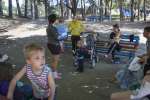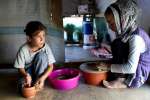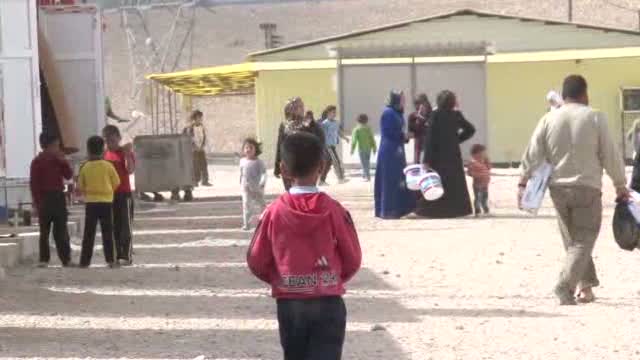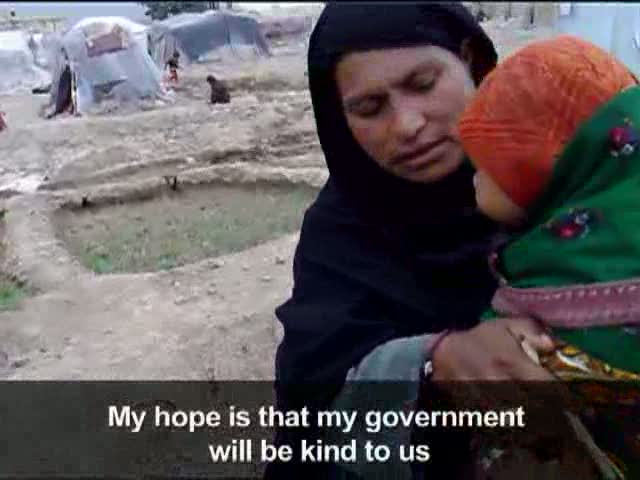- Text size
 |
|  |
|  |
| 
- Français
Conclusion on refugees with disabilities and other persons with disabilities protected and assisted by UNHCR
No. 110 (LXI) - 2010
EXCOM Conclusions, 12 October 2010
The Executive Committee,
Emphasizing that this Conclusion applies to refugees with disabilities and other persons with disabilities protected and assisted by UNHCR in accordance with the provisions of international conventions and relevant United Nations General Assembly resolutions,
Taking note of its Conclusions No. 47 (XXXVIII), No. 74 (XLV), No. 105 (LVII), No. 107 (LVIII), No. 108 (LIX) and No. 109 (LX) and the entry into force of the Convention on the Rights of Persons with Disabilities and its Optional Protocol on 3 May 2008,
Acknowledging that refugees and other persons with disabilities include those who have long-term physical, mental, intellectual and sensory impairments, which, in interaction with various barriers, including attitudinal and environmental barriers, may hinder their full and effective participation in society on an equal basis with others,
Recalling the recognition by the Convention on the Rights of Persons with Disabilities of the inherent dignity and equality of persons with disabilities, recognizing that disability is an evolving concept and acknowledging the valued existing and potential contributions made by persons with disabilities to the overall well-being and diversity of their communities,
Reaffirming the importance of mainstreaming age, gender and diversity in identifying and responding to the views and needs of all persons with disabilities; and taking note with appreciation of UNHCR's involvement in the inter-agency support group for the Convention on the Rights of Persons with Disabilities to support the promotion and implementation of the Convention on the Rights of Persons with Disabilities and its Optional Protocol,
Recognizing that the specific needs of persons with disabilities are often overlooked, especially in the early phases of humanitarian emergencies, and that they, particularly women, children and older persons with disabilities, are exposed to discrimination, exploitation, violence, and sexual and gender-based violence, and may be excluded from support and services,
Recognizing that children with disabilities are at a greater risk of abuse, neglect, abandonment, exploitation, health concerns, exposure to the risk of longer term psycho-social disturbances, family separation and denial of the right to education,
Acknowledging that services and facilities, including assistance programmes and protection, may be inaccessible to persons with disabilities,
Recognizing that refugees with disabilities may be excluded from support and services when repatriating and often have fewer opportunities for other durable solutions, namely local integration and resettlement,
Reaffirming the primary responsibility of States to take all appropriate measures to protect and assist persons with disabilities, in all situations,
Recognizing that host States, which are often developing countries, have limited resources and face various challenges in providing such services and facilities; reaffirming, therefore, the international community and UNHCR's role to assist States in fulfilling these responsibilities, in the spirit of international cooperation and burden sharing,
(a) Calls upon States and UNHCR, in cooperation with relevant partners where applicable, to protect and assist refugees and other persons with disabilities against all forms of discrimination and to provide sustainable and appropriate support in addressing all their needs;
(b) Also calls upon States, UNHCR and all relevant partners to raise awareness on disability issues and to foster respect for the rights and dignity of persons with disabilities, by providing training on the needs, rights and capabilities of refugees and other persons with disabilities, among other things;
(c) Recommends that States, UNHCR and relevant partners ensure where appropriate a swift and systematic identification and registration of refugees and other persons with disabilities, with particular attention to those who cannot communicate their own needs, in order to identify their protection and assistance needs, including as part of a global needs assessment;
(d) Recommends that States include refugees and other persons with disabilities in relevant policies and programmes and provide access to services, including through the issuance of relevant documentation;
(e) Encourages States, UNHCR and all relevant partners to ensure the participation of refugees and other persons with disabilities through appropriate consultation in the design and implementation of relevant services and programmes;
(f) Encourages States, UNHCR and all partners to communicate information, procedures, decisions and policies appropriately to ensure that these are accessible and understood by refugees and other persons with disabilities;
(g) Encourages States, UNHCR and partners to enable children and youth with disabilities to access appropriate protection, assistance and education, and to ensure the inclusion of women and girls with disabilities, protected and assisted by UNHCR, in programmes to prevent and respond to sexual and gender-based violence and other forms of exploitation;
(h) Encourages States, UNHCR and relevant partners to adopt and implement appropriate and reasonable accessibility standards, including at the start of an emergency, and to ensure that all mainstream services and programmes as well as specialized services are accessible to persons with disabilities, including those services and programmes provided within the framework of international cooperation;
(i) Reaffirms the importance of international cooperation for improving the living conditions of refugees and other persons with disabilities, particularly in developing countries, through ensuring timely availability of adequate humanitarian and development funding and other resources, including sufficient support for host communities;
(j) Recommends that States and UNHCR, as applicable, ensure that refugee status determination and all other relevant procedures are accessible and designed to enable persons with disabilities to fully and fairly represent their claims with the necessary support;
(k) Recommends that States, in cooperation with UNHCR and relevant partners, ensure that refugees with disabilities have equality of opportunity for durable solutions and are provided appropriate support;
(l) Recommends that States, in cooperation with UNHCR and relevant partners upon request, ensure that persons with disabilities, other than refugees, protected and assisted by UNHCR have equality of opportunity for solutions and are provided appropriate support;
(m) Requests UNHCR to include disability awareness in its policy guidelines and training programmes and to ensure that relevant policies, guidelines and operating standards for UNHCR staff and implementing partners are in line with this Conclusion;
(n) Requests UNHCR to provide Member States with periodic updates on the follow-up to this Conclusion, including relevant financial data.




































